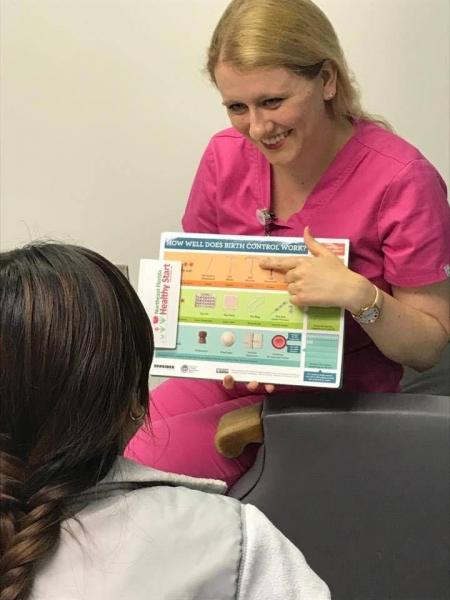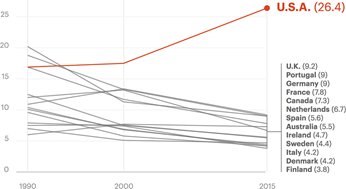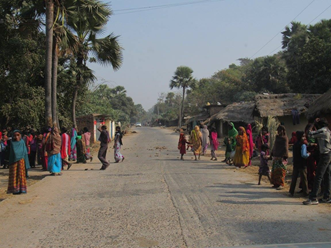Here’s to Strong, Healthy Women: May We Know Them, Be Them, Raise Them, Serve Them
 As a NHC AmeriCorps service member at UF Health – Healthy Start, I interact with women across the pinnacle moments of their journey into motherhood. I conduct pregnancy tests, meet women at their first prenatal appointments to conduct risk assessment screenings, watch them grow month-to-month, meet their beautiful newborns on the Mother-Baby unit, and in special cases, am able to manage their postpartum cases by conducting home visits in the months after birth. In light of National Women’s Health Week, I am consistently reminded that before each patient becomes a mother, she is a woman. For this reason, the healthcare of women is not only a fundamental human right, but is among the most critical markers of the overall health of communities.
As a NHC AmeriCorps service member at UF Health – Healthy Start, I interact with women across the pinnacle moments of their journey into motherhood. I conduct pregnancy tests, meet women at their first prenatal appointments to conduct risk assessment screenings, watch them grow month-to-month, meet their beautiful newborns on the Mother-Baby unit, and in special cases, am able to manage their postpartum cases by conducting home visits in the months after birth. In light of National Women’s Health Week, I am consistently reminded that before each patient becomes a mother, she is a woman. For this reason, the healthcare of women is not only a fundamental human right, but is among the most critical markers of the overall health of communities.
Due to the inextricable link between women’s health and the future of communities, it is no wonder that the WHO’s Millennium Development Goals, intended to be accomplished by 2015, prioritize the wellness of women and children by promoting gender equality and the empowerment of women, improving maternal health, and reducing child mortality. So, in 2017, what deficiencies remain? First, many young women lack access to health services or are under-insured, resulting in insufficient preventative care from primary care providers and deficits in gynecologic care. Many teen girls report getting health information from social media, friends, or online sources that may perpetuate misinformation, particularly about reproductive health.  By the same token, some women report feeling embarrassed for seeking care for symptoms that could be indicators of heart disease, cancer, stroke, or respiratory disease, the top 4 leading causes of death among women. The same can be said for women’s mental health; while a woman may experience gender specific risk factors, she also experiences the double-discrimination of being both a woman and suffering from a mental health condition. What’s more is that due to these stigmas, nearly 2 out of every 3 cases of sexual violence against women go unreported. Lastly, in direct relation to my service at UF Health, the United States has the highest maternal and infant mortality rates among industrialized nations, with rates on the rise in recent years. So, where do we go from here? It’s important to realize that no medical issue a woman faces exists in a vacuum – these are complicated narratives, interwoven with the social determinants of health. And, sadly, these disparities fail to encompass the even deeper inequalities when the intersectionality of race, socioeconomic status, LGBTQIA+ identity, and geographical location are considered.
By the same token, some women report feeling embarrassed for seeking care for symptoms that could be indicators of heart disease, cancer, stroke, or respiratory disease, the top 4 leading causes of death among women. The same can be said for women’s mental health; while a woman may experience gender specific risk factors, she also experiences the double-discrimination of being both a woman and suffering from a mental health condition. What’s more is that due to these stigmas, nearly 2 out of every 3 cases of sexual violence against women go unreported. Lastly, in direct relation to my service at UF Health, the United States has the highest maternal and infant mortality rates among industrialized nations, with rates on the rise in recent years. So, where do we go from here? It’s important to realize that no medical issue a woman faces exists in a vacuum – these are complicated narratives, interwoven with the social determinants of health. And, sadly, these disparities fail to encompass the even deeper inequalities when the intersectionality of race, socioeconomic status, LGBTQIA+ identity, and geographical location are considered.
 Before my NHC AmeriCorps service, I had taken research seminars and read extensively on women’s health in college, but I often felt I was left with data snapshots, trying to piece together a larger picture. During my senior year, I had the opportunity to travel to India to research access to basic reproductive health services and maternal care and to teach reproductive health classes. I was surprised to find that many of the same disparities women face on the other side of the globe parallel the barriers women face in my own community. This isn’t to equate one community to another, but, globally-speaking, women face analogous social, cultural, geographic, and financial disparities in accessing care, whether she is a woman in a rural village in India or a woman in rural, Northeast Florida. Likewise, when female students in India asked questions about topics like contraception, STIs, pregnancy, and menstruation, they were the same questions I had been too ashamed to ask as a teen, and they are the same questions women I serve at UF Health ask me, often shyly, on a daily basis. The tendency for us as women to be bashful about our reproductive health speaks to the sexism, taboos, and internalized gender norms of global societies. Now, through my service term, I truly feel that I am at the front lines of women’s health – educating with the hope of empowering.
Before my NHC AmeriCorps service, I had taken research seminars and read extensively on women’s health in college, but I often felt I was left with data snapshots, trying to piece together a larger picture. During my senior year, I had the opportunity to travel to India to research access to basic reproductive health services and maternal care and to teach reproductive health classes. I was surprised to find that many of the same disparities women face on the other side of the globe parallel the barriers women face in my own community. This isn’t to equate one community to another, but, globally-speaking, women face analogous social, cultural, geographic, and financial disparities in accessing care, whether she is a woman in a rural village in India or a woman in rural, Northeast Florida. Likewise, when female students in India asked questions about topics like contraception, STIs, pregnancy, and menstruation, they were the same questions I had been too ashamed to ask as a teen, and they are the same questions women I serve at UF Health ask me, often shyly, on a daily basis. The tendency for us as women to be bashful about our reproductive health speaks to the sexism, taboos, and internalized gender norms of global societies. Now, through my service term, I truly feel that I am at the front lines of women’s health – educating with the hope of empowering.
That being said, the most important quality I can instill in women is confidence. I have supported young mothers-to-be who have broken into tears at finding out they are pregnant, women experiencing emotional stress at their changing bodies and challenging circumstances such as addiction, chronic disease, mental health conditions, and domestic violence, and teen women at outreach health events that have told me they struggle with “fitting-in” with their peers. But, on the other hand, I have also met young mothers in our Nurse Family Partnership program who have told me that they notice positive differences in their parenting strategies and those of their peers due to the confidence the program instilled in them. As these examples illustrate, self-confidence is key. If we can empower a woman to be the best parent she can be, to practice healthy reproductive habits, to have the perseverance to continue breastfeeding, to expect respect from her partner, to have a voice in her childbirth experience, and to be aware of her own body and trust herself if she detects changes, we can plant a seed of confidence that will grow into every aspect of her life and help empower the family she raises. When I reflect on my service term, it has been this ongoing mission to instill strength in our moms, partnered with the support of my mentors, which has helped me to discover my own strength as a woman and future health professional.
Empowerment must be sustainable, so, beyond National Women’s Health Week, let’s prioritize women’s health year-round. You can start today by reading books such as Half the Sky that have influenced my passion for women’s health. You can be an active citizen who supports women’s access to equitable healthcare. You can raise your self-awareness of the double standards our society places on women. And, above all else, you can work to create a community that prioritizes women’s voices and autonomy over their own healthcare decisions.
This blog post was written by NHC member, Rebecca Ratusnik.
Rebecca serves at UF Health- Healthy Start as a Care Coordinator.
Host Site
Jacksonville FL, 32209
Jacksonville FL, 32209